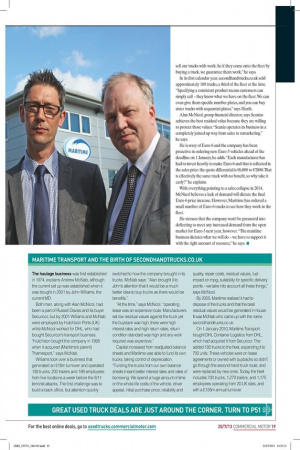MARITIME TRANSPORT AND THE BIRTH OF SECONDHANDTRUCKS.CO.UK The haulage business
Page 16

If you've noticed an error in this article please click here to report it so we can fix it.
was first established in 1974, explains Andrew McNab, although the current set up was established when it was bought in 2001 by John Williams, the current MD.
Both men, along with Alan McNicol, had been a part of Russell Davies and its buyer Securicor, but by 2001 Williams and McNab were employed by Hutchison Ports (UK) while McNicol worked for DHL, who had bought Securicor's transport business. "Hutchison bought the company in 1998 when it acquired (Maritime's parent) Thamesport," says McNab.
Williams took over a business that generated an £18m turnover and operated 136 trucks, 200 trailers and 189 employees from five locations a week before the 9/11 terrorist attacks. The first challenge was to build a back office, but attention quickly switched to how the company brought in its trucks. McNab says: "Alan brought it to John's attention that it would be a much better idea to buy trucks as there would be benefits."
"At the time," says McNicol, "operating lease was an expensive route. Manufacturers set low residual values against the truck yet the buyback was high, there were high interest rates and high return rates, return condition standard was high and any work required was expensive."
Capital increased from readjusted balance sheets and Maritime was able to fund its own trucks, taking control of depreciation. "Funding the trucks from our own balance sheets meant better interest rates and rates of borrowing. We spend a huge amount of time on the whole-life costs of the vehicle, driver appeal, initial purchase price, reliability and quality, repair costs, residual values, fuel impact on mpg, suitability for specific delivery points — we take into account all these things," says McNicol.
By 2005, Maritime realised it had to dispose of the trucks and that the best residual values would be generated in-house. It was McNab who came up with the name secondhandtrucks.co.uk.
On 1 January 2010, Maritime Transport bought DHL Container Logistics from DHL, which had acquired it from Securicor. This added 192 trucks to the fleet, expanding it to 700 units. These vehicles were on lease agreements or owned with buybacks so didn't go through the second-hand truck route, and were replaced by new ones. Today, the fleet includes 700 trucks, 1,270 trailers, and 1,175 employees operating from 20 UK sites, and with a £135m annual turnover.










































